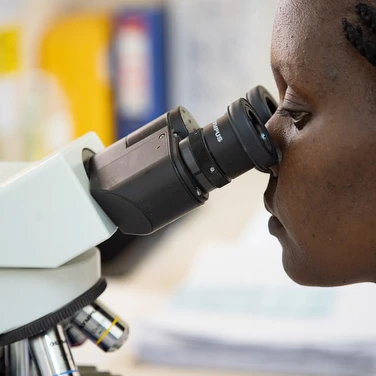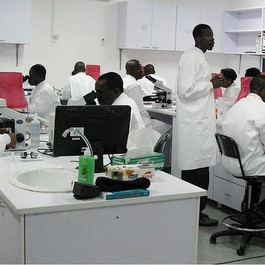Share your experience and help others understand the real-world benefits of following CLSI guidelines. Whether it's improved accuracy, enhanced efficiency, or better compliance, your story can inspire and guide fellow professionals. Submit your experience today and contribute to a global conversation on laboratory excellence!
Building Laboratory Quality and Capacity in Ghana
Overview
CLSI received President's Emergency Plan for AIDS Relief (PEPFAR) funding for work in Ghana beginning in 2010. CLSI worked over several years with the national health service in Ghana to build laboratory leadership capacity and establish systems approach to quality in laboratory medicine, leading to international accreditation.

Overview
CLSI received President's Emergency Plan for AIDS Relief (PEPFAR) funding for work in Ghana beginning in 2010. CLSI worked over several years with the national health service in Ghana to build laboratory leadership capacity and establish systems approach to quality in laboratory medicine, leading to international accreditation.
The Situation
Accurate and reliable laboratory services are critical for quality health outcomes. However, many countries struggle with a lack of infrastructure and/or personnel. Ghana in 2010 was one such country that identified this gap and set a goal to achieve international compliance with and international accreditation per ISO 15189, enlisting CLSI support for training and leadership.
The Program
Year 1: CLSI was invited to provide guidance to Ghana Health Service (GHS) to develop a laboratory accreditation policy. This document was intended to help guide accreditation preparedness activities. Additionally, CLSI provided a foundational 3-part workshop series on quality management systems (QMS) for targeted laboratories.
Year 2: The accreditation policy was developed and completed and a second QMS Workshop was conducted to further equip the participants with QMS knowledge and implementation tools that can be applied in their laboratory settings. Twenty-three participants completed the QMS workshops.
Year 3: CLSI conducted a 3-part Laboratory Assessor Training Program that equipped participants with the skills to conduct audits aligned to the ISO 15189 standard requirements. A total of 15 participants completed the training.
Years 4–5: CLSI conducted a 2-part Quality Managers’ Training Program meant to build the local capacity of the quality managers in implementing and managing QMS activities. A total of 12 participants completed the training. Additionally, CLSI worked with Ghana Association for Biomedical Laboratory Scientists (GABMLS) to integrate QMS training into existing pre-service and in-service training curricula. At least 10 GABMLS-identified local faculty completed the CLSI LQMS Online Certificate Program.
The Results
Over several years, Ghana was able to successfully upgrade the quality of its laboratory systems and operations to achieve international accreditation. In total, over 100 professionals, both leadership and bench staff, completed quality management training. CLSI training and education programs have been built into professional laboratory curricula.

Share Your Experience with CLSI Standards in your Laboratory
